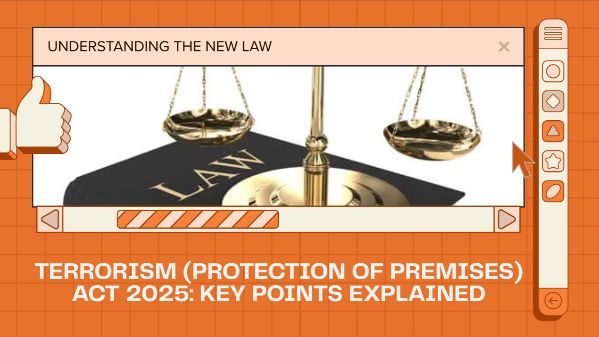Date 20 August 2025
Issue
What impact will the Terrorism (Protection of Premises) Act 2025 have on Public Safety Provisioning Requirements for Commercial and Public Establishments?
Short Answer
The Act establishes comprehensive Terrorism Protection Obligations on Qualifying Premises and Events, rendering public protection provision obligatory with comprehensive Enforcement Powers.
Development of the Bill
The Terrorism (Protection of Premises) Act 2025 marks a landmark in counter-terrorism legislation, introducing the first statutory framework for premises-based security measures across the United Kingdom. The Act adopts a Two-Tier System, distinguishing between Standard Duty Premises and Enhanced Duty Premises, with corresponding Qualifying Events subject to varied protection requirements.
Schedule 1 defines eighteen categories of ‘Qualifying Premises’: shops, food and drink venues, entertainment and leisure events, sports stadiums, libraries, museums, hotels, places of worship, healthcare centres, educational institutions, and transport terminals. The breadth of scope signals government recognition that terrorism risks cut across diverse public and commercial environments.
The Act designates the Security Industry Authority as the Lead Enforcement Body, granting it extensive investigatory powers under Schedule 3, including information-gathering, right of entry, and warrant-based procedures. Safeguards are embedded to preserve material subject to legal professional privilege.
Analysis:
The legislation significantly reshapes the legal landscape for venue security by imposing statutory duties on event organisers and property owners. Most notably, Enhanced Duty Premises must implement public protection measures, document compliance, and designate senior individuals with terrorism protection responsibilities. These requirements, while administratively burdensome, create clear accountability structures.
The enforcement regime reflects a strong governmental commitment to compliance. It combines monetary penalties, daily fines for repeated non-compliance, and criminal sanctions for breach of compliance or restriction notices. This mirrors the seriousness with which security failures are now treated.
The Act introduces coordination and cooperation obligations, mandating that premises operators work with security authorities and other stakeholders. This acknowledges that adequate terrorism protection requires integrated, system-wide responses rather than piecemeal efforts.
The licensing provisions in Part 2 further embed security into operational decision-making. Disclosure of premises security plans becomes a prerequisite for licensing applications across England, Wales, and Scotland, ensuring that security is no longer an afterthought but a central component of regulatory approval.
Conclusion
The Terrorism (Protection of Premises) Act 2025 institutes a comprehensive statutory framework that will profoundly affect how commercial and public venues operate across the UK. The Act transforms the relationship between property owners, event organisers, and counter-terrorism authorities by enforcing compulsory security obligations backed by robust enforcement powers. This legislation represents a paradigm shift towards premises-based security responsibilities, requiring industry-wide adaptation to new regulatory standards while advancing the goal of strengthening public protection.
